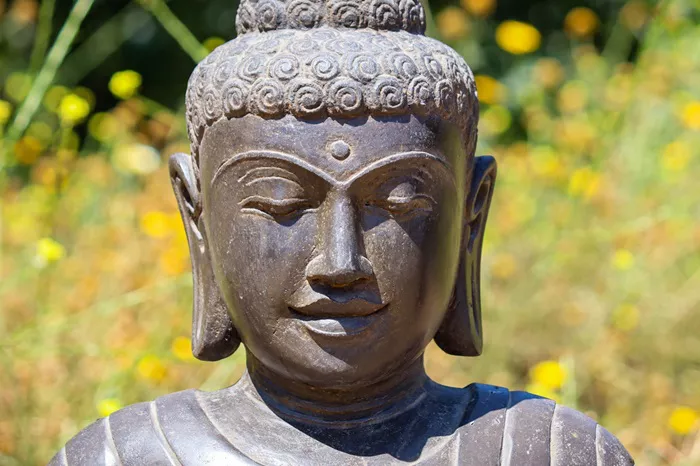The image of the Meditating Buddha is one of the most well-known symbols in Buddhism. It shows the Buddha sitting calmly, usually with his hands resting on his lap. This pose represents deep meditation and inner peace. Many people place Buddha statues in their homes or temples to inspire calmness and mindfulness.
But what does the meditating Buddha truly mean? What is its symbolism? And how can it benefit our spiritual lives? In this article, we will explore these questions clearly and simply.
Who Is the Meditating Buddha?
The Meditating Buddha is usually shown in the Dhyana Mudra pose. This means the Buddha is seated cross-legged with both hands resting in his lap, palms facing upward, and the right hand on top of the left. This gesture shows a state of deep concentration and meditation.
This image reflects the moment when Siddhartha Gautama, before becoming the Buddha, reached enlightenment under the Bodhi tree. It reminds us of the power of focused meditation to calm the mind and see the truth.
Buddha statues types and Their Significance
There are many different buddha statues types, each with its own meaning. The meditating Buddha is one of the most popular because it symbolizes peace and spiritual awakening.
Other common types include the Standing Buddha, Reclining Buddha, and Teaching Buddha. Each posture tells a story or lesson from the Buddha’s life or teachings. Understanding these helps deepen our appreciation of Buddhist art and philosophy.
Symbolism of the Meditating Buddha
Calmness and Inner Peace
The meditating Buddha is a symbol of calmness. His peaceful face and relaxed body show that true peace comes from within. When we meditate, we try to quiet our thoughts and connect with this inner calm.
Enlightenment and Wisdom
This statue also represents enlightenment — the highest goal in Buddhism. The Buddha’s meditation under the Bodhi tree led him to see the nature of life clearly, free from suffering and confusion.
Balance and Harmony
The symmetrical posture and steady breath of the Buddha show balance. This balance is not just physical but mental and spiritual too. It reminds us to find harmony in our lives despite difficulties.
How the Meditating Buddha Inspires Spiritual Growth
Encourages Mindfulness
Seeing or meditating with the Buddha statue encourages mindfulness — being fully present in the moment. Mindfulness helps reduce stress and brings clarity to daily life.
Teaches Patience and Persistence
The Buddha’s long hours of meditation remind us that spiritual growth needs time and patience. We learn to keep practicing, even when progress seems slow.
Supports Compassion and Loving-Kindness
When we follow the Buddha’s example, we grow kindness toward ourselves and others. Meditation helps open the heart and develop compassion, which is central to Buddhist practice.
Spiritual Benefits of Meditating Like the Buddha
Reduces Stress and Anxiety
Meditation calms the mind by focusing on the breath or a single point. This lowers stress hormones and helps people feel more relaxed and peaceful.
Improves Concentration and Clarity
Regular meditation increases focus and mental clarity. It trains the mind to avoid distractions and see things more clearly.
Enhances Emotional Health
Meditating like the Buddha helps manage emotions better. It supports letting go of anger, fear, and jealousy, making space for joy and contentment.
Promotes Spiritual Awakening
The ultimate goal of meditating like the Buddha is awakening or enlightenment. This means understanding life deeply, beyond suffering and confusion, and living with wisdom and compassion.
How to Practice Meditation Inspired by the Meditating Buddha
Find a Quiet Place
Choose a calm, quiet place where you will not be disturbed. This helps the mind settle easily.
Sit Comfortably
Sit cross-legged on the floor or on a chair. Keep your back straight but relaxed. Rest your hands gently in your lap, palms up, right hand on top of left, to mimic the Buddha’s pose.
Focus on Your Breath
Close your eyes and bring your attention to your breathing. Notice the air going in and out. If your mind wanders, gently bring it back to your breath.
Be Patient and Consistent
Start with just a few minutes each day. Over time, increase your meditation length. Patience is key—true benefits come with regular practice.
Where to Place Your Meditating Buddha Statue
Many people keep a buddha statues in their home, office, or meditation space. Place it somewhere clean and respected, like an altar or a quiet corner. It should be at eye level or higher, never directly on the floor.
This placement reminds us daily of the Buddha’s teachings and inspires our own practice.
Common Questions About the Meditating Buddha
What is the meaning of the meditating Buddha’s hand gesture?
The hand gesture, or Dhyana Mudra, symbolizes deep meditation and inner focus. It represents the union of wisdom and compassion.
Why is the Buddha often shown sitting cross-legged?
The cross-legged position, called the lotus or half-lotus, is stable and comfortable for long meditation sessions. It also symbolizes grounding and balance.
Can anyone benefit from meditating like the Buddha?
Yes. Meditation is for all people, regardless of background. It helps bring peace, understanding, and happiness to anyone who practices sincerely.
Conclusion
The Meditating Buddha is more than just a statue. It is a powerful symbol of peace, wisdom, and spiritual awakening. By understanding its meaning and symbolism, we can be inspired to develop our own meditation practice.
Meditating like the Buddha brings many spiritual benefits, including calmness, clarity, emotional balance, and deeper compassion. Even a few minutes a day can transform our lives and bring us closer to true happiness.

